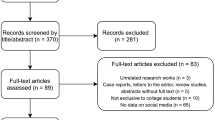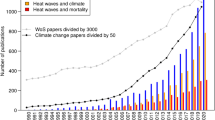Abstract
Purpose of Review
This essay reviews evidence for the current and potential effects of climate change on mental health.
Recent Findings
A growing body of research demonstrates not only that the extreme weather events associated with a changing climate can impair mental health, in particular leading to increases in depression and post-traumatic stress disorder, but also that more gradual changes in climatic conditions, such as rising temperatures and reduced air quality, are also harmful to mental health. In addition, there is increasing evidence that a significant proportion of people might be experiencing a harmful level of anxiety associated with their perception of climate change.
Summary
Mental health impacts of climate change have the potential to affect a significant proportion of the population. More research is needed to document the extent of these impacts as well as the best options for mitigating and treating them.

Similar content being viewed by others
References
Papers of particular interest, published recently, have been highlighted as: • Of importance •• Of major importance
Cooper E. Climate coverage is improving, but challenges abound heading into 2020. Media Matters; 2020. https://www.mediamatters.org/broadcast-networks/climate-journalism-had-breakout-year-2019-what-will-2020-bring. Accessed 1 Jan 2020.
Born D. Bearing witness? Polar bears as icons for climate change communication in National Geographic. Environ Commun. 2019;13(5):649–63.
Ballew MT, Leiserowitz A, Roser-Renouf C, Rosenthal SA, Kotcher JE, Marlon JR, et al. Climate change in the American mind: data, tools, and trends. Environ Sci Policy Sustain Dev. 2019;61(3):4–18.
IPCC. Climate Change 2014: Synthesis Report. Contribution of Working Groups I, II and III to the Fifth Assessment Report of the Intergovernmental Panel on Climate Change. In: Core writing team, Pachauri RK, Meyer LA, editors. Geneva: IPCC; 2014. https://www.ipcc.ch/report/ar5/syr/. Accessed 16 Dec 2020.
• Lowe SR, Bonumwezi JL, Valdespino-Hayden Z, Galea S. Post-traumatic stress and depression in the aftermath of environmental disasters: a review of quantitative studies published in 2018. Curr Environ Health Rep. 2019;6(4):344–60 A recent review of mental health consequences of environmental disasters.
Boscarino J, Hoffman S, Adams R, Figley C, Solhkhah R. Mental health outcomes among vulnerable residents after hurricane Sandy. Am J Disaster Med. 2014;9:107–20.
Obradovich N, Migliorini R. Sleep and the human impacts of climate change. Sleep Med Rev. 2018;42:1–2.
Waite TD, Chantarli K, Beck CR, Bone A, Amlôt R, Kovats S, et al. The English national cohort study of flooding and health: cross-sectional analysis of mental health outcomes at year one. BMC Public Health. 2017;17(1):129.
Fernandez A, Black J, Jones M, Wilson L, Salvador-Carulla L, Astell-Burt T, et al. Flooding and mental health: a systematic mapping review. PLoS One. 2015;10(4):e0119929. https://doi.org/10.1371/journal.pone.0119929.
Dodd W, Howard C, Rose C, Scott C, Scott P, Cunsolo A, et al. The summer of smoke: ecosocial and health impacts of a record wildfire season in the Northwest Territories, Canada. Lancet Glob Health. 2018;6:S30. https://doi.org/10.1016/S2214-109X(18)30159-1.
Brown MR, Agyapar V, Greenshaw AJ, et al. After the Fort McMurray wildfire there are significant increases in mental health symptoms in grade 7–12 students compared to controls. BMC Psychiatry. 2019;19(1):18.
Carleton TA. Crop-damaging temperatures increase suicide rates in India. Proc Natl Acad Sci. 2017;114(33):8746–51.
Edwards B, Gray M, Hunter B. The impact of drought on mental health in rural and regional Australia. Soc Indic Res. 2015;121(1):177–94.
Vins H, Bell J, Saha S, Hess J. The mental health outcomes of drought: a systematic review and causal process diagram. Int J Environ Res Public Health. 2015;12(10):13251–75 Multidisciplinary digital publishing institute.
Kessler R, Galea S, Gruber M, Sampson N, Ursano R, Wessely S. Trends in mental illness and suicidality after hurricane Katrina. Mol Psychiatry. 2008;13:374–84.
Benevolenza MA, DeRigne L. The impact of climate change and natural disasters on vulnerable populations: a systematic review of literature. J Hum Behav Soc Environ. 2019;29(2):266–81.
Simpson DM, Weissbecker I, Sephton SE. Extreme weather-related events: implications for mental health and well-being. In: I Weissbecker (Ed.) Climate change and human well-being. New York: Springer; 2011. pp. 57–78
Nagy GJ, Filho WL, Azeiteiro UM, Heimfarth J, Verocai JE, Li C. An assessment of the relationships between extreme weather events, vulnerability, and the impacts on human wellbeing in Latin America. Int J Environ Res Public Health. 2018;15:1802.
Miles-Novelo A, Anderson C. Climate change and psychology: effects of rapid global warming on violence and aggression. Curr Climate Change Rep. 2019;5(1):36–46.
Williams MN, Hill SR, Spicer J. Will climate change increase or decrease suicide rates? The differing effects of geographical, seasonal, and irregular variation in temperature on suicide incidence. Clim Chang. 2015;130(4):519–28.
• Burke M, González F, Baylis P, Heft-Neal S, Baysan C, Basu S, et al. Higher temperatures increase suicide rates in the United States and Mexico. Nat Clim Chang. 2018;8:723–9. https://doi.org/10.1038/s41558-018-0222-x. This paper presents impressive statistical evidence of the relationship between heat and suicide in two different countries.
Hansen A, Bi P, Nitschke M, Ryan P, Pisaniello D, Tucker G. The effect of heat waves on mental health in a temperate Australian city. Environ Health Perspect. 2008;116(10):1369–75.
Wang X, Lavigne E, Ouellette-kuntz H, Chen BE. Acute impacts of extreme temperature exposure on emergency room admissions related to mental and behavior disorders in Toronto, Canada. J Affect Disord. 2014;155:154–61.
Chan EYY, Lam HCY, So SHW, Goggins WB, Ho J, Liu S, et al. Association between ambient temperatures and mental disorder hospitalizations in a subtropical city: a time-series study of Hong Kong special administrative region. Int J Environ Res Public Health. 2018;15(4):754–72.
Mullins JT, Corey W. Temperature and mental health: evidence from the spectrum of mental health outcomes. J Health Econ. 2019;68:102240.
• Obradovich N, Migliorini R, Paulus MP, Rahwan I. Empirical evidence of mental health risks posed by climate change. Proc Natl Acad Sci. 2018;115(43):10953–8 A rigorous and recent discussion of the ways in which climate change threatens mental health.
Obradovich N, Fowler J. Climate change may alter human physical activity patterns. Nat Hum Behav. 2017;1(5):1–7 .
Fang Y, Naik V, Horowitz LW, Mauzerall DL. Air pollution and associated human mortality: the role of air pollutant emissions, climate change and methane concentration increases from the preindustrial period to present. Atmos Chem Phys. 2013;13(3):1377–94.
Newbury JB, Arseneault L, Beevers S, et al. Association of air pollution exposure with psychotic experiences during adolescence. JAMA Psychiatry. 2019;76(6):614–23.
Sass V, Kravitz-Wirtz N, Karceski SM, Hajat A, Crowder K, Takeuchi D. The effects of air pollution on individual psychological distress. Health Place. 2017;48:72–9.
Herting MM, Younan D, Campbell CE, Chen JC. Outdoor air pollution and brain structure and function from across childhood to young adulthood: a methodological review of brain MRI studies. Front Public Health. 2019;7:332.
Lu JG. Air pollution: a systematic review of its psychological, economic, and social effects. Curr Opin Psychol. 2020;32:52–65.
Davenport C, Robertson C. Resettling the first American ‘climate refugees.’ New York Times; 2016. https://www.nytimes.com/2016/05/03/us/resettling-the-first-american-climate-refugees.html. Accessed 18 Dec 2020.
Pumariega AJ, Rothe E, Pumariega JB. Mental health of immigrants and refugees. Community Ment Health J. 2005;41(5):581–97. https://doi.org/10.1007/s10597-005-6363-1.
Carleton TA, Hsiang S. Social and economic impacts of climate. Science. 2016;353(6304).
Climate Change Threatens National Security Says Pentagon. United Nations Framework Convention on Climate Change. Retrieved from https://unfccc.int/news/climate-change-threatens-national-security-says-pentagon. Accessed 18 Dec 2020.
World Health Organization. Gender, climate change, and health. Geneva: WHO; 2014. http://www.who.int/globalchange/publications/reports/gender_climate_change/en/
Page L, Hajat S, Kovats RS, Howard L. Temperature-related deaths in people with psychosis, dementia, and substance misuse. Br J Psychiatry. 2012;200:485–90.
Zivin J, Shrader J. Temperature extremes, health, and human capital. Futur Child. 2016;26:31–50.
Shonkoff JP, Garner A, Siegel BS, Dobbins MI, Earls MF, McGuinn L, et al. The lifelong effects of early childhood adversity and toxic stress. Am Acad Pediatr. 2012;129:232–46. https://doi.org/10.1542/peds.2011-2663.
• Cunsolo WA, Harper S, Ford JD, Edge V, Landman K, Houle K, et al. Climate change and mental health: an exploratory case study from Rigolet, Nunatsiavut, Labrador. Clim Chang. 2013;121:255–70. https://doi.org/10.1007/s10584-013-0875-4Describes the cultural significance of climate change for an indigenous community and the ways in which that has an impact on mental health.
Jaakkola JJ, Juntunen S, Näkkäläjärvi K. The holistic effects of climate change on the culture, well-being, and health of the Saami, the only indigenous people in the European Union. Curr Environ Health Rep. 2018;5(4):401–17.
Raygorodetsky G. The archipelago of hope. New York: Pegasus Books; 2017.
McGinn M. 2019’s biggest pop-culture trend was climate anxiety. Grist Magazine; 2019. Retrieved from https://grist.org/politics/2019s-biggest-pop-culture-trend-was-climate-anxiety/. Accessed 18 Dec 2020.
Albrecht G. Chronic environmental change: emerging ‘psychoterratic’ syndromes. In: Weissbecker I, editor. Climate change and human well-being: global challenges and opportunities. New York: Springer; 2011. p. 43–56.
•• Clayton S, Karazsia B. Development and validation of a measure of climate change anxiety. J Environ Psychol. 2020;69:101434. https://doi.org/10.1016/j.jenvp.2020.101434. This paper discusses the potential clinical significance of anxiety or worry about climate change.
Bamberg S, Reese JS, Schulte M. Environmental protection through societal change: what psychology knows about collective climate action—and what it needs to find out. In: Clayton S, Manning C, editors. Psychology and Climate Change. New York: Academic Press; 2018. pp. 185–213.
Clayton S. Climate anxiety: psychological responses to climate change. J Anxiety Disord. 2020;74:102263.
Doherty T. Mental health impacts. In: Levy B, Patz J, editors. Climate change and public health. New York: Oxford University Press; 2015. p. 195–214.
Author information
Authors and Affiliations
Corresponding author
Ethics declarations
Conflict of Interest
The author declares that she has no conflict of interest.
Human and Animal Rights and Informed Consent
This article does not include any new studies with human or animal subjects performed by the author.
Additional information
Publisher’s Note
Springer Nature remains neutral with regard to jurisdictional claims in published maps and institutional affiliations.
This article is part of the Topical Collection on Climate Change and Health
Rights and permissions
About this article
Cite this article
Clayton, S. Climate Change and Mental Health. Curr Envir Health Rpt 8, 1–6 (2021). https://doi.org/10.1007/s40572-020-00303-3
Accepted:
Published:
Issue Date:
DOI: https://doi.org/10.1007/s40572-020-00303-3




